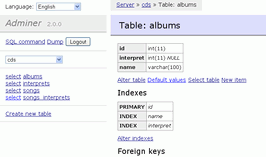tl;dr If you use phpMyAdmin, stop right now and give a try to Adminer.
If you have several customers with different hostings, you have experienced problems accessing to their MySQL databases for sure. The situation comes like this: you get a new support ticket and ask for hosting access, but usually you just get FTP access. So now you have to ask again about the phpMyAdmin URL. Or you get access to their hosting panel, but there is just a horrible DB manager.
What can you do? Trying to deploy phpMyAdmin yourself in a customer’s hosting is a nightmare, and can take several minutes. That makes no sense, specially if you just need to check a tiny detail.
 Adminer is the solution, as it is just one file. That means uploading it is just a couple of seconds. In a moment you are operating with the database. Magic.
Adminer is the solution, as it is just one file. That means uploading it is just a couple of seconds. In a moment you are operating with the database. Magic.
I don’t really know how I discovered about Adminer, but as soon as I started using it, it became an everyday tool. Actually I don’t remember when was the last time I used phpMyAdmin. Adminer as a single file is perfect, but moreover it comes with a lot of features that surprass phpMyAdmin. And it has an active development, so each new version comes with new features, like more databases (PostgreSQL, SQLite, MS SQL, Oracle, SimpleDB, Elasticsearch and MongoDB).
Finally there is a cut-down version, Adminer Editor, that only allows simple CRUD operations. That’s perfect if you need to quickly provide your customer a way to edit the content while you develop a proper back-office.